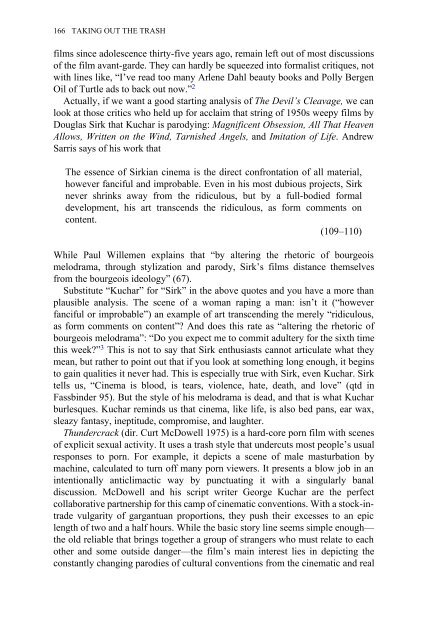Edited by Moe Meyer - Get a Free Blog
Edited by Moe Meyer - Get a Free Blog
Edited by Moe Meyer - Get a Free Blog
Create successful ePaper yourself
Turn your PDF publications into a flip-book with our unique Google optimized e-Paper software.
166 TAKING OUT THE TRASH<br />
films since adolescence thirty-five years ago, remain left out of most discussions<br />
of the film avant-garde. They can hardly be squeezed into formalist critiques, not<br />
with lines like, “I’ve read too many Arlene Dahl beauty books and Polly Bergen<br />
Oil of Turtle ads to back out now.” 2<br />
Actually, if we want a good starting analysis of The Devil’s Cleavage, we can<br />
look at those critics who held up for acclaim that string of 1950s weepy films <strong>by</strong><br />
Douglas Sirk that Kuchar is parodying: Magnificent Obsession, All That Heaven<br />
Allows, Written on the Wind, Tarnished Angels, and Imitation of Life. Andrew<br />
Sarris says of his work that<br />
The essence of Sirkian cinema is the direct confrontation of all material,<br />
however fanciful and improbable. Even in his most dubious projects, Sirk<br />
never shrinks away from the ridiculous, but <strong>by</strong> a full-bodied formal<br />
development, his art transcends the ridiculous, as form comments on<br />
content.<br />
(109–110)<br />
While Paul Willemen explains that “<strong>by</strong> altering the rhetoric of bourgeois<br />
melodrama, through stylization and parody, Sirk’s films distance themselves<br />
from the bourgeois ideology” (67).<br />
Substitute “Kuchar” for “Sirk” in the above quotes and you have a more than<br />
plausible analysis. The scene of a woman raping a man: isn’t it (“however<br />
fanciful or improbable”) an example of art transcending the merely “ridiculous,<br />
as form comments on content”? And does this rate as “altering the rhetoric of<br />
bourgeois melodrama”: “Do you expect me to commit adultery for the sixth time<br />
this week?” 3 This is not to say that Sirk enthusiasts cannot articulate what they<br />
mean, but rather to point out that if you look at something long enough, it begins<br />
to gain qualities it never had. This is especially true with Sirk, even Kuchar. Sirk<br />
tells us, “Cinema is blood, is tears, violence, hate, death, and love” (qtd in<br />
Fassbinder 95). But the style of his melodrama is dead, and that is what Kuchar<br />
burlesques. Kuchar reminds us that cinema, like life, is also bed pans, ear wax,<br />
sleazy fantasy, ineptitude, compromise, and laughter.<br />
Thundercrack (dir. Curt McDowell 1975) is a hard-core porn film with scenes<br />
of explicit sexual activity. It uses a trash style that undercuts most people’s usual<br />
responses to porn. For example, it depicts a scene of male masturbation <strong>by</strong><br />
machine, calculated to turn off many porn viewers. It presents a blow job in an<br />
intentionally anticlimactic way <strong>by</strong> punctuating it with a singularly banal<br />
discussion. McDowell and his script writer George Kuchar are the perfect<br />
collaborative partnership for this camp of cinematic conventions. With a stock-intrade<br />
vulgarity of gargantuan proportions, they push their excesses to an epic<br />
length of two and a half hours. While the basic story line seems simple enough—<br />
the old reliable that brings together a group of strangers who must relate to each<br />
other and some outside danger—the film’s main interest lies in depicting the<br />
constantly changing parodies of cultural conventions from the cinematic and real


